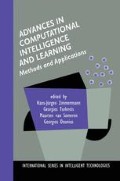Abstract
Over the last five years efforts have been devoted towards the development and validation of mechanical test result models relating to a range of alloy steels. Several neural-network based models have been developed, two of which are related to the mechanical test results of Ultimate Tensile Strength (UTS) and Reduction of Area (ROA). The ultimate aim of developing these models is to pave the way to process optimisation through better predictions of mechanical properties. In this research the exploitation of such neural network models is proposed in order to determine the optimal alloy composition and heat treatment temperatures required, given certain predefined mechanical properties such as the UTS and ROA. Genetic Algorithms are used for this purpose. The results obtained are very encouraging.
Access this chapter
Tax calculation will be finalised at checkout
Purchases are for personal use only
Preview
Unable to display preview. Download preview PDF.
References
Goldberg, D.E.: “Genetic Algorithms in Search, Optimization and Machine Learning”, Addison-Wesley publishers, 1989, ISBN 0-201-15767-5.
Holland, J.H.: ‘Genetic Algorithms and the optimal allocation of trials’, SIAM Journal of Computing, 1973, 2, pp 89–104.
Holland, J.H.: ‘Adaptation in natural and artificial systems’, Addison Wesley Publishers, 1975.
Linkens, D.A. and Nyongesa, H.O.: ‘Genetic algorithms for fuzzy control’, IEE Proceedings, PtD, Control Theory and Applications, 1995, 142(3), pp 161–176.
Mahfouf, M., Linkens, D.A. and Abbod, M.F.: ‘Multi-objective genetic optimisation of GPC and SOFLC tuning parameters using a new fuzzy based ranking method’, lEE Proceedings, PtD, Control Theory and Applications, 2000, 147(3), pp 344–354.
Tenner, J.: ‘Optimisation of the Heat treatment of Steel using Neural Networks’, PhD Thesis, Department of Automatic Control and Systems Engineering, The University of Sheffield, The United Kingdom, 1999.
Author information
Authors and Affiliations
Editor information
Rights and permissions
Copyright information
© 2002 Springer Science+Business Media New York
About this chapter
Cite this chapter
Mahfouf, M. (2002). Optimal Design of Alloy Steels Using Genetic Algorithms. In: Zimmermann, HJ., Tselentis, G., van Someren, M., Dounias, G. (eds) Advances in Computational Intelligence and Learning. International Series in Intelligent Technologies, vol 18. Springer, Dordrecht. https://doi.org/10.1007/978-94-010-0324-7_30
Download citation
DOI: https://doi.org/10.1007/978-94-010-0324-7_30
Publisher Name: Springer, Dordrecht
Print ISBN: 978-94-010-3872-0
Online ISBN: 978-94-010-0324-7
eBook Packages: Springer Book Archive

